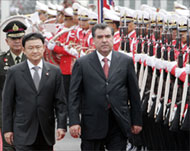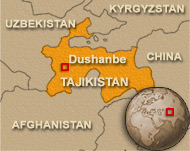Tajik Islamic party slams hijab ban
Tajikistan’s Islamic party has criticised a new ban on wearing Islamic headscarves in secular schools in this ex-Soviet republic as an inadmissible violation of civil rights.

The Islamic Renaissance Party (IRP) said in a statement that the ban, announced on 19 October, was against the interests of the majority of Tajiks and contradicted the constitution and international laws.
It added that the ban could provoke a negative public response.
In announcing the ban, Education Minister Abdudjabor Rakhmonov said that wearing the hijab, or headscarf traditionally worn by Muslim women, and other religious symbols were unacceptable in secular schools and in violation of the constitution and education laws.
Rakhmonov also expressed concern that pupils spent too much time in mosques at the expense of their education.
Majority Muslims
Tajikistan, which neighbours Afghanistan, is constitutionally a secular country, but more than 90% of its population are Muslims.
 |
|
Emomali Rakhmonov (R) has |
The IRP emerged just before the 1991 Soviet collapse and won official recognition in a five-year civil war, that ended in 1997 with a UN-brokered power-sharing agreement.
However, the party’s influence has eroded in recent years, as President Emomali Rakhmonov, who during the civil war fought the Islamic opposition with Moscow’s backing, has consolidated his grip on power by sidelining or jailing a number of potential challengers to himself, including several senior IRP officials.
The IRP is the only official Islamic party in the former Soviet Central Asia.
Human rights groups
Rights groups such as Amnesty International and Human Rights Watch (HRW) have documented concerns over the state of human rights in the country.
The groups cite fraudulent elections, media censorship, religious persecution, and abuses by security forces, as among the country’s most serious human rights problems.
 |
|
Tajikistan is noted for fraudulent |
In its World Report 2005, HRW states Rakhmonov’s opponents are vulnerable to prosecution on politically motivated charges.
In January 2004, the Supreme Court sentenced Shamsuddin Shamsuddinov, deputy chairman of Nahzati Islomi Tojikiston (the Islamic Renaissance Party) – which participates in the power-sharing government – to 16 years in prison on charges of polygamy, organising an armed criminal group during the civil war, and illegally crossing the border.
Three other IRP members were given lengthy prison terms for alleged complicity in Shamsuddinov’s armed group.
Shamsuddinov, who has maintained his innocence since his arrest in May 2003, alleges he was beaten and tortured with electric shocks while awaiting trial.
Other opposition parties enjoy limited resources and popular support. “In principle, they are allowed to exist. In practice, the parties face significant obstacles in registering with the Ministry of Justice,” states HRW.
Torture, abuse
HRW also found that although the Tajik Constitution guarantees freedom of religion – in practice, government officials monitor, and interfere with, the activities of religious groups.
All religious organisations must register with the State Committee on Religious Affairs. Independent religious groups considered extremist or politicised – including the banned group Hizb ut-Tahrir, or Party of Liberation – face government scrutiny and harassment.
In 2004, more than 70 alleged members of Hizb ut-Tahrir were arrested. In September, 20 suspected members were convicted: nine received prison sentences from 13 to 15 years for crimes including: “organising a criminal group, inciting national, racial, religious and ethnic strife.”
Some of those detained on suspicion of involvement in Hizb ut-Tahrir allege beatings, sexual violence, and electric shocks while in police custody.